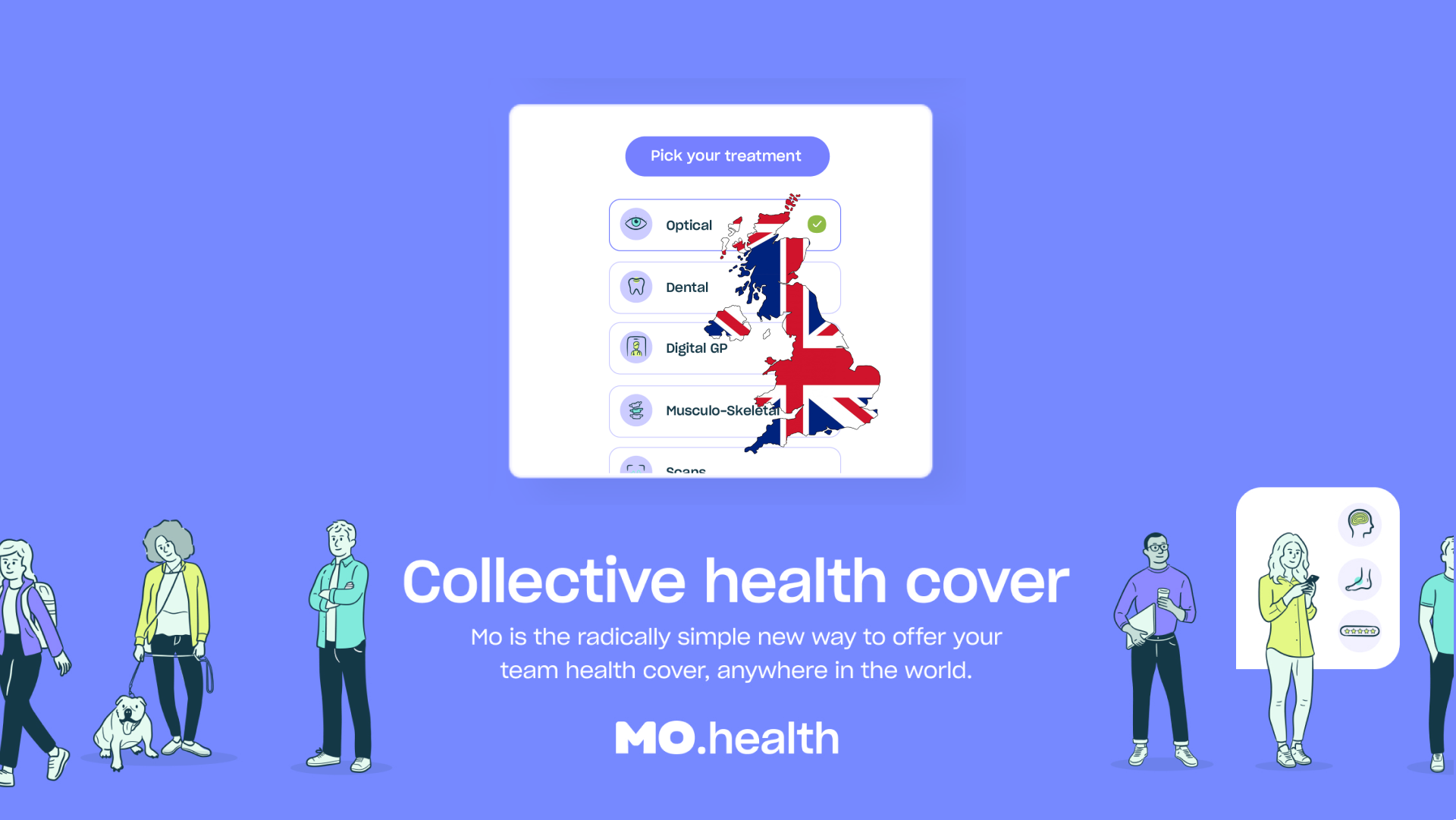Introduction
How much does private health insurance cost?
Navigating the world of healthcare in the UK can be a bit like trying to find your way through a maze – complex, sometimes baffling, and prone to hitting dead-ends. With the NHS as the backbone of UK healthcare, many still turn to private medical insurance for quicker access and more personalized care. Understanding the costs of Private Health Insurance in the UK is tricky, so we have prepared this simple but comprehensive guide.
Let’s dive into the features of the different options, so you can make an informed decision that suits your team’s needs.
What does Private Medical Insurance offer?
Private Medical Insurance in the UK covers the cost of private medical care for health conditions that start after your policy begins. You can be treated in private hospitals, often with a shorter waiting time than you will find with the NHS.
Here’s an overview of what is typically included in a private healthcare policy and some common exclusions:
Common Inclusions:
- Inpatient Treatment: Covers private treatment costs when you need to stay in a hospital overnight or longer, including the charges for a private room, nursing care, surgeries, and diagnostic tests.
- Outpatient Treatment: Many policies cover outpatient care such as specialist consultations, diagnostic tests, and some therapies.
- Daycare Surgery: Treatments where you don’t need to stay overnight in a hospital.
- Cancer Care: Comprehensive cover often includes cancer diagnosis, medical treatment (like chemotherapy, radiotherapy), and sometimes post-treatment follow-up.
- Diagnostic Tests: Includes blood tests, CT scans, MRI scans, and PET scans.
- Specialist Consultations: Fees for private treatment with a consultant.
- Additional Therapies: Physiotherapy, osteopathy, chiropractic treatments, and sometimes alternative therapies like acupuncture.
- Mental Health Care: Good policies cover mental healthcare, including psychiatric care and therapy.
- Prescription Medicine and Drugs: Medication prescribed by a private doctor or consultant.
Optional Extras:
- Dental and Optical Cover: Some insurers offer this as an additional benefit.
- Maternity Care: Coverage for private maternity care is available with some policies.
- Home Nursing: Providing nursing care at your home after hospital treatment.
- International Cover: For medical treatment outside the UK.
Common Exclusions:
- Pre-existing Conditions: Ailments or illnesses you had before taking out the policy.
- Chronic Conditions: Long-term illnesses or conditions that need ongoing monitoring or management.
- Cosmetic Surgery: Procedures for aesthetic purposes.
- Normal Pregnancy and Childbirth: Most standard policies do not cover routine pregnancy and childbirth.
- Accident and Emergency Admissions: Private health insurance usually does not cover A&E visits.
- Drug Abuse and Self-inflicted Injuries: Generally excluded from coverage.
- Organ Transplant: Some policies might not cover organ transplant surgeries.
Additional Considerations:
- Policy Limits: There are often limits on how much you can claim for certain treatments.
- Excess: Some policies require you to pay a certain amount towards your treatment costs before the insurance kicks in.
- Hospital and Specialist Choice: Depending on your policy, there may be restrictions on which hospitals and specialists you can use.
It’s important to read the terms and conditions of your specific policy carefully, as coverage can vary significantly between different insurers and plans. Always check with your insurer if you’re unsure about what is and isn’t covered.
What Influences Private Health Insurance Costs?
To understand how much private health insurance costs, several key elements come into play:
- Age and Health: It’s no surprise that as we age, we might need more medical attention. Insurers consider this, so costs generally increase with age.
- Level of Cover: From basic to comprehensive, the extent of coverage you choose will impact your pocket.
- Lifestyle Factors: If you’re a smoker or have a high-risk job, expect this to be reflected in your premiums.
- Location: Yes, where you live in the UK can affect your insurance costs due to regional variations in healthcare pricing.
Average Costs of Private Health Insurance in the UK
Understanding the cost of private health insurance in the UK requires a closer look at how different factors influence the premiums. Let’s break it down:
Private Health Insurance costs by Age
- Young Adults (18-25): Typically, this group enjoys the lowest prices, with annual costs averaging around £600 to £700. The rationale is lower health risks at this age.
- Middle-Aged Adults (26-50): As the risk of health issues begins to increase, so do the costs of your private medical insurance. Here, you might see annual costs ranging from £800 to £1,200.
- Seniors (50+): This age group can expect the highest rates due to increased health risks associated with age. Premiums can range from £1,200 to £2,000 or more annually.
- Some private medical insurance policies have age limits, so check the fine print if you are looking for cover for your whole family, or for your whole team and their children.
Private Health Insurance costs by Lifestyle Factors
- Smokers vs Non-Smokers: Smokers can expect to pay up to 50% more than non-smokers. For instance, a middle-aged smoker might pay around £1,800 per year compared to £1,200 for a non-smoker of the same age.
- Occupational Risks: High-risk occupations may also see a hike in rates. For example, a construction worker working in a high risk environment might pay 10-20% more than someone in a low-risk office job.
- Pre-existing medical conditions: insurers will charge a higher medical premium to cover pre-existing medical conditions. You may be asked to provide medical history information for the quotation.
Private Health Insurance costs by Level of Cover
- Basic Plans: Covering essential treatments and emergency surgeries, these plans can range from £500 to £1,000 per year.
- Mid-Range Plans: Including more comprehensive cover like specialist consultations and outpatient treatments, expect to pay between £1,000 and £1,600.
- Comprehensive Plans: Offering the most extensive cover, including mental health and alternative therapies, premiums can be anywhere from £1,500 to over £3,000 annually.
Private Health Insurance costs by Region
- London and Southeast England: Here, private health insurance costs tend to be higher due to the higher cost of living and healthcare services. Rates can be up to 20% higher than the national average.
- Northern England, Scotland, and Wales: Typically, premiums are slightly lower in these regions compared to the national average.
Additional Points to Consider
- Group Plans: businesses sourcing and buying on behalf of their teams can negotiate better prices.
- Deductibles and Co-Pays: Opting for a higher deductible can lower your premiums, but means more out-of-pocket expenses when you need care.
- Moratoriums: You can reduce the cost of your health insurance policy by adding a delay before you can make high-cost claims. This may be to exclude pre existing conditions.
Average Private Health Insurance costs by Age Group
How much does Private Medical Insurance cost? Some benchmark guide prices from a review in November 2023.
- 20-year-olds: £36.75
- 30-year-olds: £48.47
- 40-year-olds: £60.55
- 50-year-olds: £78.29
- 60-year-olds: £112.90
- 70-year-olds: £112.90.
It’s important to note that individual circumstances and specific policy details can significantly influence the final insurance costs. Therefore, getting advice with an independent health insurance broker or a range of quotes from different providers is recommended to find out how much health insurance costs for your team.
Healthcare Cash Plans as an Alternative
Now, let’s talk about healthcare cash plans. These are not your traditional insurance plans but offer a way to claim back money spent on routine healthcare expenses like dental check-ups or new glasses. They’re typically more affordable than full-blown private insurance. While they don’t cover major medical conditions, they’re a fantastic way to manage everyday health costs.
Comparing Private Health Insurance with NHS Services
While the NHS provides comprehensive healthcare services at the point of delivery, private health insurance offers faster access to care, more choice over where and when you’re treated, and often more comfortable hospital facilities.
An NHS hospital will offer world-class treatment, however private health insurance can provide easy access to treatment.
It’s not about one being better than the other; it’s about what works best for your individual health needs.
Finding Affordable Private Health Insurance and Healthcare Cash Plans
Looking for the best deal on how much health insurance costs? Here are some tips:
- Compare Quotes: Just like shopping for a new phone, comparing different plans and providers can save you money.
- Consider Your Employer’s Scheme: Many companies offer health insurance as a perk.
- Look at the reviews from existing customers. Often a lowest price can mean an underwhelming claims experience. With your health at stake, it is crucial that your health plan is there when you need it.
Additional Costs to Consider
When budgeting for health insurance costs or a cash plan, don’t forget to factor in potential out-of-pocket expenses like excess fees, co-pays, or additional charges for specific treatments.
Conclusion
Whether you opt for private health insurance or a healthcare cash plan, the key is understanding what you’re getting for your money. Think about what you and your family really need in terms of healthcare. With the right information, you can find a solution that offers peace of mind without breaking the bank.
Mo.health: A Modern Collective Model for Health Cover
Mo.health is pioneering a new approach to health cover, tailored for modern teams and companies. It is a people-powered collective, not a traditional insurance company, aiming to create the most people-centric health cover on the planet.
How Mo.health Works
- Monthly Subscriptions: Members of Mo.health pay a flat monthly subscription based on the number of people in their team. This makes it a flexible and scalable option for businesses.
- Independent Trust Fund: The members’ contributions are locked into an independent Trust, which is accessible by members to fund their healthcare needs.
- Direct Payment for Care: Members use the fund to pay for healthcare as needed, without the typical insurance claims process. They can visit any practice or clinic that accepts Mastercard, offering them freedom of choice and convenience.
- International Coverage: Unlike many traditional insurers, Mo’s cover is international, providing flexibility for members who travel or live abroad.
Advantages Over Traditional Insurance
- Transparency and Simplicity: Mo.health prides itself on its simple and transparent pricing structure, in contrast to traditional insurance models.
- No Quibbling Over Claims: The collective model eliminates the incentive to deny claims, offering a fundamentally different dynamic in terms of claim processing.
- Shared Benefits: Any surplus in the fund is directed towards more benefits or lower fees for the members, ensuring that the community reaps the collective rewards.
Mo.health’s Unique Approach
- Mo.health is not just about providing health cover; it’s about being part of a larger community movement. By being a member, companies and their employees contribute to a broader effort to reshape the health insurance landscape, focusing on fairness and collective benefit.




